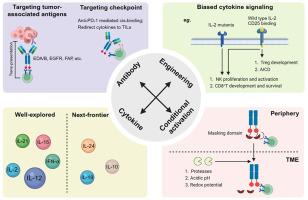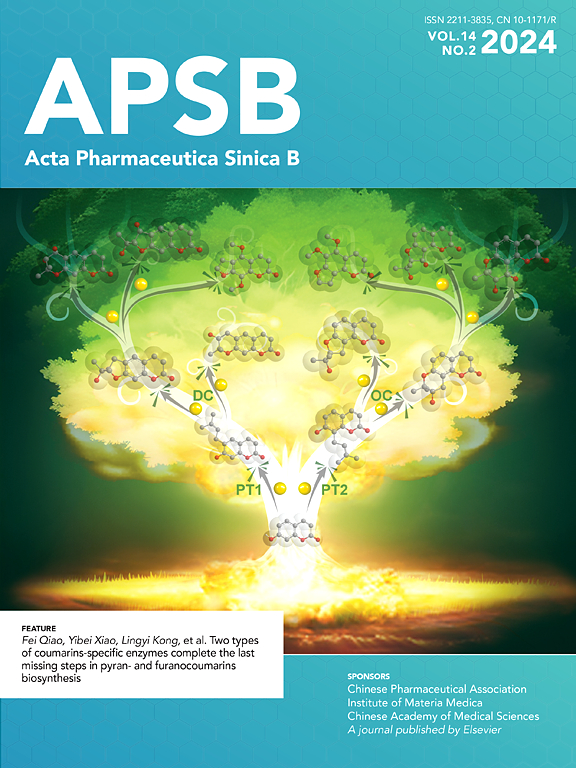Advancements and challenges in immunocytokines: A new arsenal against cancer
IF 14.7
1区 医学
Q1 PHARMACOLOGY & PHARMACY
引用次数: 0
Abstract
Immunocytokines, employing targeted antibodies to concentrate cytokines at tumor sites, have shown potential advantages such as prolonged cytokine half-lives, mitigated adverse effects, and synergistic antitumor efficacy from both antibody and cytokine components. First, we present an in-depth analysis of the advancements of immunocytokines evaluated in preclinical and clinical applications. Notably, anti-PD-1-based immunocytokines can redirect cytokines to intratumoral CD8+ T cells and reinvigorate them to elicit robust antitumor immune responses. Then, we focus on their molecular structures and action mechanisms, striving to elucidate the correlations between diverse molecular structures and their antitumor efficacy. Moreover, our exploration extends to the realm of novel cytokines, including IL-10, IL-18, and IL-24, unraveling their potential in the construction of immunocytokines. However, safety concerns remain substantial barriers to immunocytokines' development. To address this challenge, we explore potential strategies, such as cytokine engineering and prodrug design, which can foster next-generation immunocytokines development. Overall, this review concentrates on the design of molecular structures in immunocytokines, underscoring the direction and focus of ongoing efforts to improve safety profiles while maximizing therapeutic efficacy.

免疫细胞因子的进步与挑战:抗击癌症的新武器
免疫细胞因子利用靶向抗体将细胞因子集中在肿瘤部位,具有延长细胞因子半衰期、减轻不良反应以及抗体和细胞因子协同抗肿瘤功效等潜在优势。首先,我们深入分析了免疫细胞因子在临床前和临床应用中的进展。值得注意的是,基于抗 PD-1 的免疫细胞因子可以将细胞因子重新定向到瘤内 CD8 T 细胞,并重新激活它们,从而激发强大的抗肿瘤免疫反应。然后,我们重点研究其分子结构和作用机制,努力阐明不同分子结构与其抗肿瘤功效之间的相关性。此外,我们的探索还延伸到新型细胞因子领域,包括 IL-10、IL-18 和 IL-24,揭示它们在构建免疫细胞因子方面的潜力。然而,安全性问题仍然是开发免疫细胞因子的主要障碍。为了应对这一挑战,我们探讨了细胞因子工程和原药设计等潜在策略,这些策略可以促进下一代免疫细胞因子的开发。总之,这篇综述集中探讨了免疫细胞因子的分子结构设计,强调了在最大限度地提高疗效的同时改善安全性的努力方向和重点。
本文章由计算机程序翻译,如有差异,请以英文原文为准。
求助全文
约1分钟内获得全文
求助全文
来源期刊

Acta Pharmaceutica Sinica. B
Pharmacology, Toxicology and Pharmaceutics-General Pharmacology, Toxicology and Pharmaceutics
CiteScore
22.40
自引率
5.50%
发文量
1051
审稿时长
19 weeks
期刊介绍:
The Journal of the Institute of Materia Medica, Chinese Academy of Medical Sciences, and the Chinese Pharmaceutical Association oversees the peer review process for Acta Pharmaceutica Sinica. B (APSB).
Published monthly in English, APSB is dedicated to disseminating significant original research articles, rapid communications, and high-quality reviews that highlight recent advances across various pharmaceutical sciences domains. These encompass pharmacology, pharmaceutics, medicinal chemistry, natural products, pharmacognosy, pharmaceutical analysis, and pharmacokinetics.
A part of the Acta Pharmaceutica Sinica series, established in 1953 and indexed in prominent databases like Chemical Abstracts, Index Medicus, SciFinder Scholar, Biological Abstracts, International Pharmaceutical Abstracts, Cambridge Scientific Abstracts, and Current Bibliography on Science and Technology, APSB is sponsored by the Institute of Materia Medica, Chinese Academy of Medical Sciences, and the Chinese Pharmaceutical Association. Its production and hosting are facilitated by Elsevier B.V. This collaborative effort ensures APSB's commitment to delivering valuable contributions to the pharmaceutical sciences community.
 求助内容:
求助内容: 应助结果提醒方式:
应助结果提醒方式:


